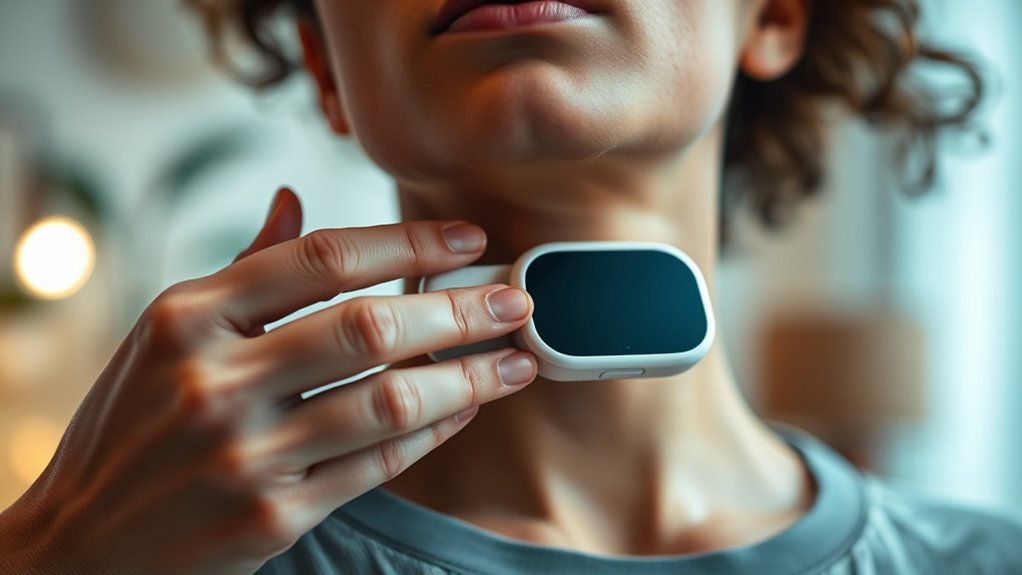Vagus nerve stimulation (VNS) uses electrical signals to activate your vagus nerve, helping your body move from stress to relaxation. It improves your nervous system’s flexibility, increasing heart rate variability and balancing stress hormones like cortisol. This activation promotes calmness, enhances neuroplasticity, and rewires your brain’s stress responses. Over time, VNS can make you more resilient and less reactive to stress. If you explore further, you’ll discover how these techniques can truly transform your well-being.
Key Takeaways
- Vagus nerve stimulation (VNS) activates the parasympathetic system, promoting relaxation and reducing stress hormone levels like cortisol.
- VNS enhances heart rate variability (HRV), improving the body’s ability to adapt to stress and recover quickly.
- Combining VNS with neuroplasticity techniques like meditation and deep breathing rewires brain responses toward calmness.
- Regular VNS use can create lasting changes in stress reactivity and emotional resilience.
- By restoring physiological balance, VNS supports mental well-being and helps manage anxiety and inflammation.

Vagus nerve stimulation (VNS) is a medical technique that uses electrical impulses to activate the vagus nerve, a crucial part of your nervous system. This nerve plays a key role in regulating your body’s responses to stress and maintaining overall balance. When you stimulate the vagus nerve, you’re fundamentally helping your body shift from a state of stress to one of calm. This process is closely linked to neuroplasticity techniques, which are methods designed to rewire your brain’s responses and enhance resilience. By engaging in practices like deep breathing, meditation, or biofeedback alongside VNS, you can strengthen your nervous system’s ability to adapt and recover from stress. These techniques promote neuroplasticity, allowing your brain to form new connections that favor relaxation and emotional stability.
Another important aspect influenced by VNS is heart rate variability (HRV), a measure of how well your body adapts to stress and recovers from it. Higher HRV indicates a flexible nervous system capable of efficiently switching between stress and relaxation states. When you stimulate the vagus nerve, you often experience an increase in HRV, signaling improved autonomic nervous system balance. This better regulation helps you manage anxiety, reduce inflammation, and improve overall mental health. You might notice, over time, that your heart responds more calmly to stressful situations, and your recovery periods are quicker. Engaging in neuroplasticity techniques while practicing VNS can amplify these benefits, reinforcing your body’s ability to stay resilient in the face of daily stressors.
Moreover, VNS influences your parasympathetic nervous system, which is responsible for rest, digestion, and recovery. By activating this system, you can lessen the impact of stress hormones like cortisol, helping your body restore equilibrium. When combined with neuroplasticity techniques, VNS becomes a powerful tool to reprogram your stress responses, creating lasting changes in how you react to challenges. As your brain develops new pathways that support calmness, your HRV can improve further, making you more adaptable and less reactive. Additionally, understanding the role of contrast ratio in home cinema projectors can help you appreciate the importance of balanced stimulation and relaxation for optimal mental health and well-being.
Frequently Asked Questions
Can Vagus Nerve Stimulation Be Used for Anxiety Disorders?
Yes, vagus nerve stimulation can be effective for anxiety management. Vagus nerve therapy helps regulate your nervous system, reducing anxiety symptoms and promoting relaxation. By activating the vagus nerve, you may experience a calmer mood and decreased stress levels. While it’s not a universal cure, many find it beneficial as part of their anxiety treatment plan. Consult a healthcare professional to explore if vagus nerve therapy suits your needs.
Are There Any Long-Term Risks Associated With Vagus Nerve Stimulation?
Long-term safety of vagus nerve stimulation is generally good, but you should be aware of potential side effects like voice changes, coughing, or throat discomfort. While serious risks are rare, it is crucial to monitor how you feel over time and consult your doctor regularly. If you experience persistent issues, they can adjust the therapy or suggest alternative treatments. Overall, with proper medical guidance, VNS is a safe, effective option for managing stress and related conditions.
How Quickly Can One Expect Stress Reduction Benefits?
You can expect to see some immediate effects from vagus nerve stimulation, often within minutes to hours, as it helps activate your relaxation response. Timing expectations vary, but many people notice reduced stress levels shortly after starting treatments or practices like deep breathing or electrical stimulation. Consistent use over days or weeks can lead to more significant and lasting stress reduction, making it a promising tool for managing stress effectively.
Is Vagus Nerve Stimulation Effective Without Medication?
Think of your vagus nerve as a calming river flowing through your body. Yes, vagus nerve stimulation can be effective without medication, serving as a natural method to reduce stress. It acts like an alternative therapy, helping to regulate your nervous system without relying on drugs. By practicing techniques like deep breathing or meditation, you tap into this natural pathway, enhancing your well-being and promoting relaxation through your own inner reservoir of calm.
What Are the Different Methods of Stimulating the Vagus Nerve?
You can stimulate your vagus nerve using various methods, including electrical impulses like vagus nerve stimulation devices and physical techniques such as deep breathing, meditation, and cold exposure. These approaches activate the nerve directly or indirectly, helping to reduce stress and promote relaxation. Trying different methods allows you to find what works best for you, and combining them can enhance overall benefits for your mental and physical well-being.
Conclusion
By stimulating your vagus nerve, you unleash a powerful tool to reduce stress and promote calm. It’s like turning down the volume on chaos, even when life gets loud. While technology can’t erase all worries, it offers a gentle counterbalance—a quiet anchor amid the storm. Embrace vagus nerve stimulation, and you’ll discover that sometimes, the quietest signals have the loudest impact on your well-being.

